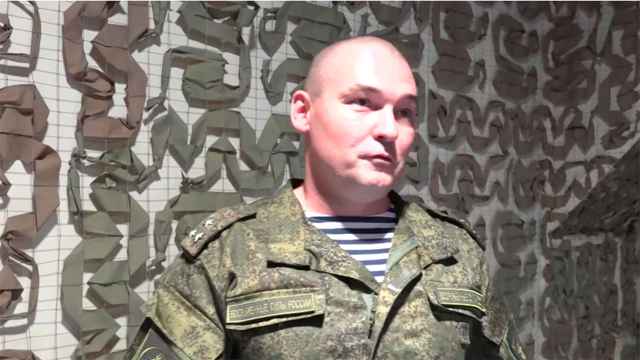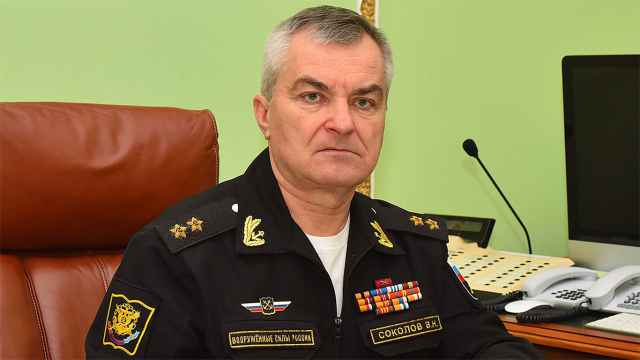The Pentagon on Friday denied reports that it helped Ukrainian forces sink the Russian warship Moskva in the Black Sea last month in a stunning setback for Moscow's invasion.
"We did not provide Ukraine with specific targeting information for the Moskva," Pentagon spokesman John Kirby said in a statement.
Kirby said the U.S. had "no prior knowledge" of the plan to strike the ship, which sank April 13, leaving a still-unclear number of Russian sailors dead or missing.
"We were not involved in the Ukrainians’ decision to strike the ship or in the operation they carried out," Kirby said.
"The Ukrainians have their own intelligence capabilities to track and target Russian naval vessels, as they did in this case," he said.
U.S. media have reported in recent days that the United States has helped Ukraine identify and target the Moskva as well as Russian generals while they are in the field.
Gerasimov targeted?
Wary of being seen as too closely involved in Ukraine's war against the Russian invasion, the U.S. military says it shares battlefield intelligence to help Ukrainians defend their country but denies helping them pick targets or carry out attacks.
Ukraine has been particularly successful in attacking Russian command positions, and, according to reports, came close last week to striking a location near the front lines in the Donbas region where Russia's top general, Valery Gerasimov, was believed to be visiting troops.
Ukraine's forces may have shelled the location just a few hours after Gerasimov had left, the unconfirmed reports said.
On Thursday Kirby insisted that reports that the Ukrainians used specific U.S. intelligence to kill several Russian generals were false.
"We do not provide intelligence on the location of senior military leaders on the battlefield or participate in the targeting decisions of the Ukrainian military," Kirby said.
He said Ukraine makes its own decisions on whether to target a Russian leader or not.
"Ukraine combines information that we and other partners provide with the intelligence that they themselves are gathering on the battlefield," he said.
"Then they make their own decisions, and they take their own actions."
Propaganda coup
The deaths of the generals and the attack on the Moskva have proven significant propaganda coups for the Kyiv in the war, which began when Russian forces invaded the country on Feb. 24.
The Moskva, which sailed normally with a crew of around 500, was struck by two Ukrainian anti-ship missiles as it sailed south of Odesa. Still on fire, in sank several hours later on April 14 as rescue vessels attempted to tow it to safety.
One week later Moscow reported that 396 crew members were rescued and that one was killed and 27 missing. It blamed the loss on a tragic fire onboard, rather than a strike by the Ukrainians.
Washington is supplying billions of dollars' worth of military equipment and munitions to Ukraine and is training their forces on how to operate them.
It is also providing Kyiv with information garnered from satellites, electronic surveillance operations and other sources of intelligence.
But the White House and Pentagon have sought to limit knowledge of the full extent of the U.S. assistance, hoping to avoid provoking Russia into a broader conflict beyond Ukraine's borders.
Even so, Washington's support for Ukraine has only grown, and become more forthright, since the Russians invaded on Feb. 24.
At the beginning of the conflict the United States said it wanted only to help Ukraine survive.
But now Washington says its goal in the war is to debilitate Russia for the long term.
"We want to see Russia weakened to the degree that it can't do the kinds of things that it has done in invading Ukraine," U.S. Secretary of Defense Lloyd Austin said after a visit to Kyiv in late April.
A Message from The Moscow Times:
Dear readers,
We are facing unprecedented challenges. Russia's Prosecutor General's Office has designated The Moscow Times as an "undesirable" organization, criminalizing our work and putting our staff at risk of prosecution. This follows our earlier unjust labeling as a "foreign agent."
These actions are direct attempts to silence independent journalism in Russia. The authorities claim our work "discredits the decisions of the Russian leadership." We see things differently: we strive to provide accurate, unbiased reporting on Russia.
We, the journalists of The Moscow Times, refuse to be silenced. But to continue our work, we need your help.
Your support, no matter how small, makes a world of difference. If you can, please support us monthly starting from just $2. It's quick to set up, and every contribution makes a significant impact.
By supporting The Moscow Times, you're defending open, independent journalism in the face of repression. Thank you for standing with us.
Remind me later.






